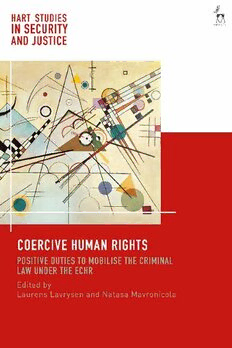
Coercive Human Rights: Positive Duties to Mobilise the Criminal Law under the ECHR PDF
323 Pages·2020·3.528 MB·English
Most books are stored in the elastic cloud where traffic is expensive. For this reason, we have a limit on daily download.
Preview Coercive Human Rights: Positive Duties to Mobilise the Criminal Law under the ECHR
Description:
Traditionally, human rights have protected those facing the sharp edge of the criminal justice system. But over time human rights law has become increasingly infused with duties to mobilise criminal law towards protection and redress for the violation of rights. These developments give rise to a whole host of questions concerning the precise parameters of coercive human rights, the rationale(s) that underpin them, and their effects and implications for victims, perpetrators, domestic legal systems, and for the theory and practice of human rights and criminal justice. This collection addresses these questions with a focus on the rich jurisprudence of the European Court of Human Rights (ECtHR). It explores four interlocking themes surrounding the issue of coercive human rights:First, the key threads in the doctrine of the ECtHR on duties to mobilise the criminal law as a means of delivering human rights protection.Secondly, the factors that contribute to a readiness to demand coercive measures, including discrimination and vulnerability, and other key justificatory reasoning shaping the development of coercive human rights.Thirdly, the most pressing challenges for the ECtHR’s coercive duties doctrine, including:Fourthly, the (prospective) evolution of the coercive human rights doctrine and its application within national jurisdictions.Volume 7 in Hart Studies in Security and Justice
See more
The list of books you might like
Most books are stored in the elastic cloud where traffic is expensive. For this reason, we have a limit on daily download.
